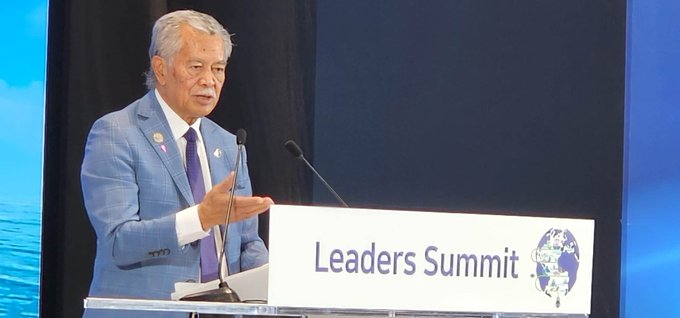By Pita Ligaiula in Seoul
Pacific Islands Forum Secretary General and Ocean Commissioner Henry Puna says ‘ocean conservation is vital to our survival, our way of life, our economies, and absolutely essential in addressing climate change.’
In his remarks at the World Climate Industry Expo in Busan attended by Pacific and Small Islands Developing States (SIDS) leaders including Belize and Bahamas, Puna said the same ocean that sustains the Pacific, sustains Korea, and indeed the whole world.
“The Ocean is our greatest resource, providing the basis for most of our economic and tourism activities, and home to the biggest tuna resource in the world. It contributes US$2.5 trillion annually to the global economy – a figure which is expected to reach US$3 trillion by 2030. It provides food, jobs and income for almost 3 billion people, mostly from developing countries.
“We MUST all do what it takes, to end over-exploitation of our ocean and its resources.
“We MUST reduce global CO2 emissions to mitigate ocean acidification. We MUST set aside ocean conservation areas, to preserve our unique coral and marine species. We MUST protect our marine ecosystems, and the rich biodiversity of life that exists in our Oceans. We MUST invest in Ocean research and observation systems, to fully study and understand the impacts of climate change on the ocean.
“The science is clear”, SG Puna told leaders in Busan.
He said warming ocean surface temperatures are also impacting long-term climatic changes, and climate change is in turn, impacting our oceans.
“We are now caught in a vicious cycle.
“Currently, at approximately 1.2 degrees Celsius of average global warming above pre-industrial levels, our seas are rising, our oceans are warming and becoming acidic. It is driving the endless cycle of increased frequency and intensity of tropical cyclones, typhoons, storm surges, water security issues….and the list goes on. We only need to look south eastward from where we are to see the truth of this statement with the damage being wreaked by Super Typhoon Mawar.
“Our communities’ coastal defences have been breached, our resilience continually tested, and it is wreaking havoc on our environment, and devastating the lives of our people. Ladies and Gentlemen, the tides are changing. And we need to hold back these changing tides. It is a monumental undertaking, but one we MUST face, and overcome,” stressed Puna.
He said rising sea levels have eaten away Pacific coastlines, caused coastal flooding and erosion, displacing our people.
“Our Leaders have responded to this reality. They have led the charge with their Pacific Islands Forum Declaration, on Preserving Maritime Zones in the Face of Climate Change-related Sea-Level Rise. This is a key, collective response to ensure legal stability, security, certainty and predictability of our maritime zones, guaranteed under the Law of the Sea, notwithstanding climate change-related sea-level rise.
“It reaffirms for our large ocean states, the full enjoyment of sovereign rights, jurisdiction and privileges under the Convention. We continue to call on all states, to join this initiative,” said SG Puna.
SG Puna said the good news is that even as our oceans are threatened by the impacts of climate change, they continue to be our biggest asset in the fight against climate change.
“Oceans are the biggest carbon sequestration mechanism, but the sequestration process no doubt also puts pressure on the health and resilience of the oceans, through the inevitable increasing levels of oceans acidification as a consequence.
“In the Pacific, our member countries have set ambitious marine conservation targets, with many countries already setting aside sizeable areas as Marine Protected Area (MPAs) such as the Cook Islands. Some have also set their sights on ‘No Fishing Zones’ in their EEZs. For example, some member countries have a ‘30 by 30’ marine conservation target, aiming to set aside 30 percent of their total marine areas as protected and marine conservation areas by 2030.
“I am pleased to say that the Pacific nations carry a world-leading vision for the future of our ocean, but are living with a disproportionate burden from the state of our ocean along with other small island nations, due to climate change, pollutions, and other impacts, not of our making. You could say our sea of islands is being left with a bill, that we did not incur,” emphasised Puna.
Puna also said the shared prosperity and security of our Blue Pacific, and our people, can only safely exist if the international community pursues efforts, to limit global warming to below 1.5⁰C.
“Mobilising action to limit global greenhouse gas emissions and climate change impacts is paramount.
“It will protect the ocean and its dependent communities from the threats described above, and maximise adaptation opportunities. We call on the international community, to meet or exceed their obligations and the timelines set out under the Paris Agreement, and deliver more ambitious climate action.
“We look forward to support from you on our Pacific call for an agenda item on the Ocean-Climate nexus at the upcoming COP28 in the UAE. The inclusion of the ocean-climate discussions to the apex of global climate negotiations, is not only logical, but necessary. With your support and together, I know we can ensure the development of a work programme on Oceans, within the UNFCCC process,” said SG Puna.
SOURCE: PACNEWS













